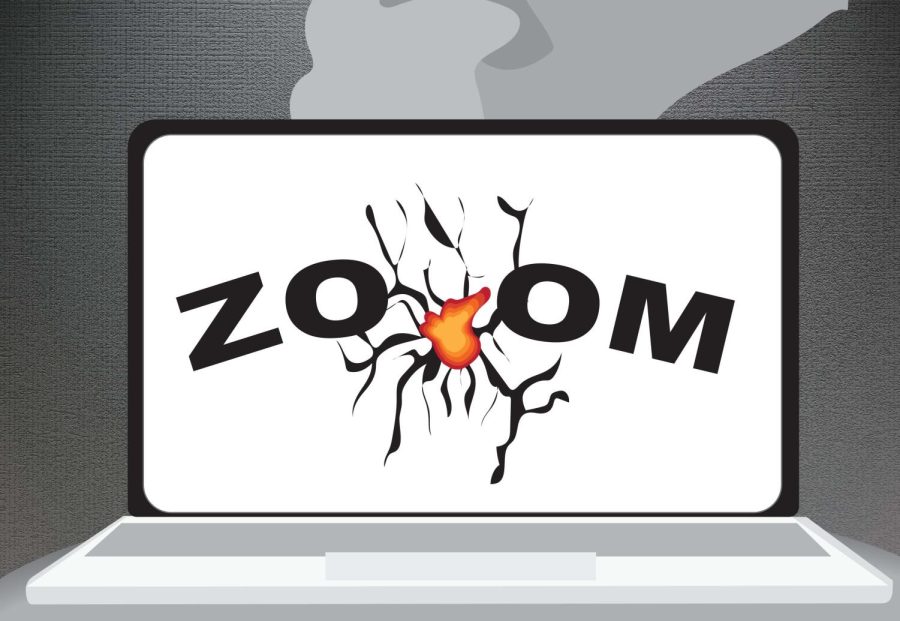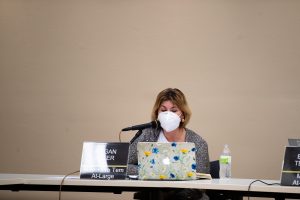Shift to virtual life gives rise to ‘Zoombombing’ and racist outbursts
The pandemic shifted life to a virtual platform, while simultaneously creating a gateway for racism into legislative meetings statewide. Black legislators remain undeterred from leading communities.
February 1, 2022
Two years into the pandemic, much of life continues to exist on virtual platforms, including some legislative and government meetings across Iowa. From Iowa Democratic Black Caucus meetings to Facebook virtual legislative forums, Black Iowa lawmakers have become increasingly subject to racism due to the surge of “Zoombombing.”
Racist Zoombombing incidents are not uncommon. In 2021, during February alone, Public Source reported 30 Black History Month events held on Zoom were attacked by unknown users who yelled racist slurs and showed graphic images.
Most recently, a meeting of Black Iowa legislators and party leaders in January was interrupted by a Zoombomber shouting racial slurs and drawing offensive messages on the screen.
Defining Zoombombing
Rep. Ako Abdul-Samad, D–Des Moines, has experienced multiple instances of virtual legislative meetings being disrupted by racist and vulgar outbursts, including a February 2021 legislative forum with Rep. Marti Anderson, Rep. Jo Oldson, and Sen. Janet Petersen — all Democrats representing Des Moines — hosted on Facebook Live.
“Zoombombing is an act where individuals purposely disrupt a meeting with vulgar language, racist statements, and the goal is to try to see that individuals on a zoom call cannot proceed with businesses and the purpose of the call,” Abdul-Samad said.
Al Womble, chair of the Iowa Democratic Black Caucus, said Zoom has created increased accessibility for state and national meetings.
Timeline by Meg Doster/The Daily Iowan
When attempting to reach new people, the goal is to see new participants in legislative meetings, so it can be difficult to recognize Zoombombers based on the names that they use to attend meetings, Womble said.
“Zoom has been a blessing and a curse,” Womble said. “We have now been able to coordinate with individuals all across the United States of America, in order to conduct meetings, get information, and have different speakers, which has been wonderful.”
Disrupting the community
Womble described Zoombombing as an act of “mental terrorism,” an attempt to scare Black legislators from organizing and informing their communities.
“These individuals want to do anything they can to disrupt our community to prevent us from organizing, to prevent us from participating in the democratic process, but also running as candidates and becoming a lot of the leaders ourselves,” Womble said.
On Jan. 7, the Des Moines People’s Condition of the State, attended by multiple Black legislators discussing legislative priorities for the 2022 session and hosted by Womble, was Zoombombed with racial slurs and violent threats.
RELATED: ‘Zoombombing’ disrupts online connections as UI classes, government meetings move online
Rep. Phyllis Thede, D–Bettendorf, said she was in the middle of her speech during the forum when she was interrupted by outbursts of racial slurs, inappropriate language, as well as racist depictions drawn on the Powerpoint and typed in the meeting’s chat.
“We seem to be seeing lots of things like this where people feel emboldened to call somebody the n-word,” Thede said. “So, unfortunately, I believe it’s the sign of the times and we have to do something to change that.”
Womble said, after each incident of Zoombombing, the police are notified and given a recording of the meeting, as well as any other information that may help in tracking down the Zoombombers. When state representatives are involved, the Department of Criminal Investigations is notified as well.
The solutions
To prevent these racist incidents, Womble said Iowa Democratic Black Caucus meetings now require advance registration and the meetings will have waiting rooms so that the host can see who is attempting to enter.
This still offers difficulties, as Zoombombers often use fake names and profile pictures, he added.
Members of local and state law enforcement agencies will also be attending meetings incognito to further deter Zoombombers and offer a more immediate response to incidents, Womble said.
Ty Coleman, Iowa City media production services coordinator, recommends webinar mode for active prevention of disruptive outbursts in legislative meetings.
Webinars allow for view-only participation from attendees, unless unmuted by the meeting host. Attendees still have the ability to participate via the meeting chat, Q&As, or polls.
“What we ultimately ended up determining was that webinar mode in Zoom, gives you the most control for kind of controlling the gateways that people come through to where they might have an opportunity to Zoombomb,” Coleman said.
Abdul-Samad said, though Zoombombings are disruptive, they do not affect his work, as the meetings continue despite any interruptions.
He said he is thankful in a way that incidents of Zoombombing have happened because he utilizes the racist outbursts as teaching moments for meeting attendees that have never witnessed racism firsthand.
“We do not have the luxury to allow individuals of that caliber to prevent us from doing the work we do,” Abdul-Samad said. “And we cannot let them take us off our square, our path, take our eyes off the prize.”






